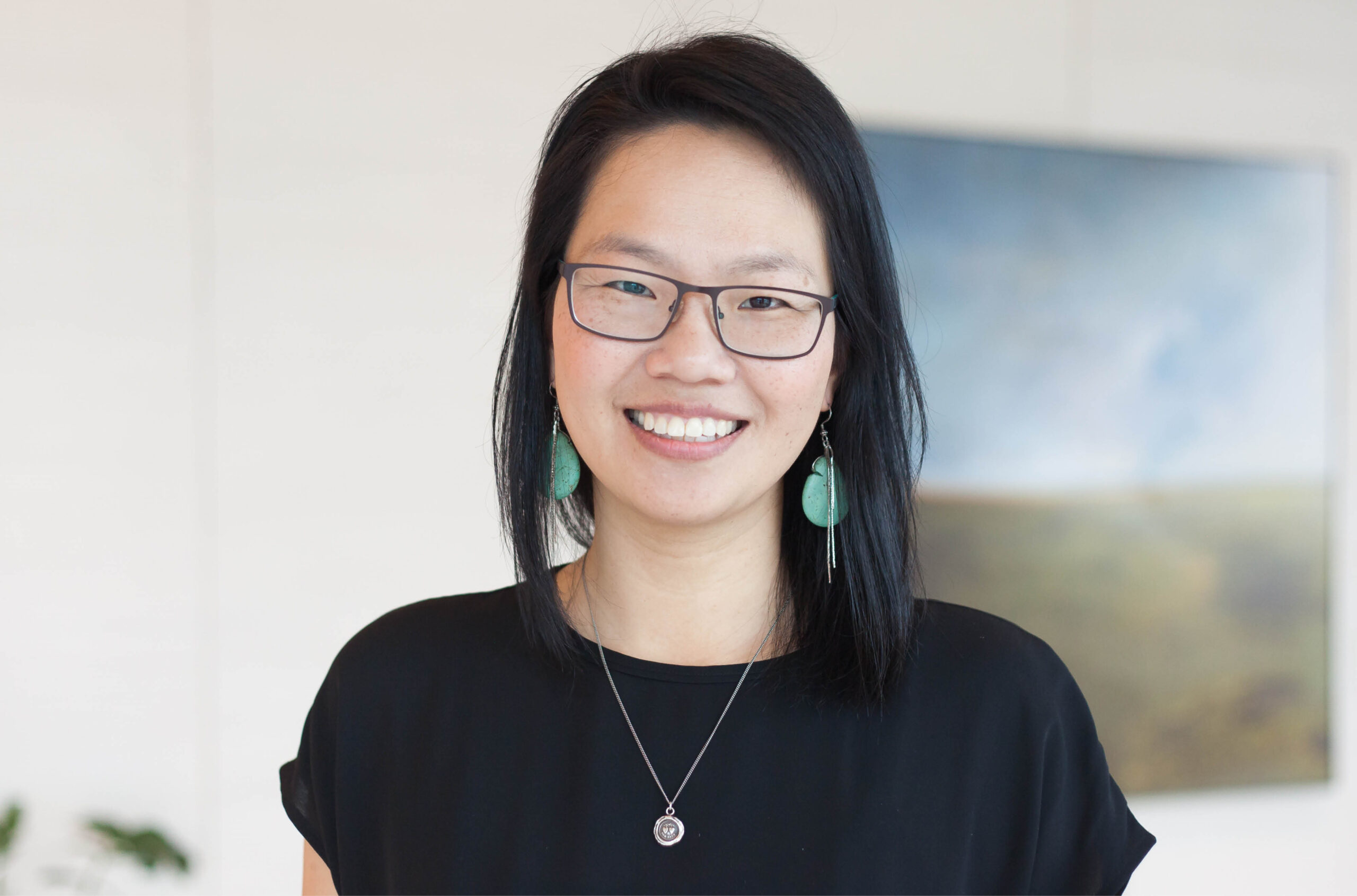Where kindness rules
For professor Fiona Rawle, compassionate teaching is the bedrock for student success.

One day not long ago during virtual office hours, Fiona Rawle found herself meeting the mother, father, grandfather and neighbour of one of the 900 students in her first-year biology class at University of Toronto Mississauga. “We’d finished discussing the assignment, so I suggested a conversation,” said Dr. Rawle. “Instead, the student asked if they could introduce me to their family. It was unexpected and wonderful and reminded me how a sense of community enriches any course.”
Dr. Rawle, the associate dean of undergraduate education at UTM, is a proponent of a “pedagogy of kindness” – a teaching approach rooted in care, mutual respect and inclusion that research has shown enhances students’ learning and well-being. When instruction moved online, she was determined to build relationships with her students in new ways and make them feel like more than another name on the screen. It wasn’t easy, and some days it felt like an overwhelming task. But she said positive feedback from students and small, gratifying moments like this impromptu chat proved her efforts weren’t in vain.
Dr. Rawle has a long-standing interest in improving science education, both through individual teaching strategies and university-wide efforts. Right now, she’s focused on how to move forward after a difficult and disruptive couple of years. “I’m reflecting a lot on the pandemic’s impact on teaching and learning, and what we should leave behind and what we should take with us.”
While the pandemic may be easing, she said the need to make kindness central in teaching is just as urgent – not solely because of the documented increase in mental health concerns among students, but because students learn better when they feel connected to their instructors. “Thinking back on the professors that have had a huge impact on me and my academic career, I don’t remember single acts of kindness,” said Dr. Rawle, who is a professor in the department of biology and director of the Robert Gillespie Academic Skills Centre. “I remember when there was a foundation of care, when professors showed me that they prioritized our student-instructor relationship and listened to my ideas and opinions.”
It’s not enough for faculty to pledge they’ll uphold grand concepts like compassion and kindness, she said. “They need to consider what these look like in practice.” In Dr. Rawle’s classes, students often get to select essay topics and vote on due dates from an approved range. “I’m not making things easier. I’m offering choice and flexibility to ease student stress, promote wellness and expand avenues for learning.” Dr. Rawle has received dozens of emails from students expressing their gratitude for these practices, and students’ formal evaluations of her teaching routinely mention how much her classes have improved their mental health and attitudes toward learning.
Demonstrating genuine curiosity about students’ lives – inside and outside the classroom – and creating opportunities for student feedback are also key to a pedagogy of kindness, said Dr. Rawle. Whether in-person or online, she asks students to submit their favourite songs, makes and shares a class playlist and features one song at the end of each class. Another tradition is the question of the day, which could be about students’ thoughts on recent lectures and assignments (“What is your muddiest point from the last week”) or about their state of mind (“What gives you hope?”). The next class, she presents their answers – and hers. “The exercise often highlights how much we all have in common.”
One of the commonalities Dr. Rawle wants students to recognize is that everyone fails at one time or another, though individuals define failure differently. For some, it means literally failing an assignment or exam; for others, it means getting anything less than an A. She underlines how failure is integral to the scientific process – sparking experimental refinements, new questions and innovative solutions. It’s a useful bridge to one of her central research and teaching interests: how to reshape students’ perception of failure so they can see it as productive, not shameful.
In collaboration with other UTM faculty, Dr. Rawle is exploring ways to show students the merits of failure in both science and everyday life. They’ve shown that certain instructional methods, such as awarding marks when students show how they solved a problem, even if they don’t arrive at the correct answer, and requiring students to reflect on their failures in journals, can boost students’ resilience and improve their study habits. Teaching students to bounce back from failure is especially critical in first year, when they may be falling short for the first time in their academic lives, she said. A recent survey of first-year biology students found that societal and family pressures to succeed were the largest contributors to students’ fear of failure.
On the bright side, Dr. Rawle said, “students also told us that more classroom discussion and open communication about experiences of failure would reduce its stigma.” This is where the open dialogue inherent in a strong instructor-student connection comes in. “As professors, we should model learning through struggle and be honest and vulnerable with our students.” For her, this means revealing a disastrous mark she received in organic chemistry. Sometimes she even brings in her test for proof.
Yet Dr. Rawle is not a fan of what she calls “wellness theatre,” where faculty might send emails to students urging them to practice self-care. “Though they may be well-intentioned, we have to move beyond words to provide meaningful structural support for student wellness in our classrooms and across the university,” she said. Rather than being an add-on, “a pedagogy of kindness should be the cornerstone of course design and teaching practice.”
Dr. Rawle often uses social media to spread the word about how she and other instructors at U of T and elsewhere are adopting a pedagogy of kindness. In the fall of 2019, for example, she posted a letter on Twitter that she’d sent to her students at the start of term. It laid out her commitment to support students during an uncertain, stressful time while still challenging them to push boundaries in their learning.
“I got a lot of great feedback on that letter, and other professors started writing their own,” she said, noting that she wrote start-of-term letters to students even pre-pandemic to set the tone for the class. “Over the past couple of years, I’ve noticed more and more faculty members doing so many impactful things to forge connections with students.”
For Dr. Rawle, creating a teaching and learning environment that’s welcoming and equitable for everyone is closely related to showing kindness in the classroom. She speaks openly about how gender bias in fields such as math, science and engineering has personally affected her over the years. She recalls that when she was a young professor, she felt it was important to be called ‘Dr’ to reinforce her expertise, while some of her male colleagues would insist that students call them by their first names. A related struggle that persists today for Dr. Rawle and her female colleagues, she said, is the use of academic titles for men but not for women in academic presentations, media interviews and similar situations. She still relies on mentors and a small support network of female professors to bolster her morale at times. Through her research and advocacy, she’s investigating strategies to overcome gender and racial bias and other barriers to inclusion at the university. One way, she said, is to use research from diverse scholars in course material.
Last year, Dr. Rawle became the acting co-chair of the Toronto Initiative for Diversity and Excellence, a group of U of T faculty members from across all disciplines aiming to advance equity and diversity at the university. They provide resources and free educational sessions on unconscious bias, among other subjects, to interested instructors. “Everyone has biases,” she said, “and it’s vital to learn about them so we can mitigate their negative effects on students and faculty.”
If instructors can acknowledge their biases, failures and everyday struggles, said Dr. Rawle, they’ll help build a university culture that’s more conducive to student well-being and, in turn, student learning. “It’s so important to emphasize that we’re all works in progress, and the professor standing with you – not in front of you – will make mistakes and get it wrong and learn new things. It’s about valuing the process of learning together instead of only looking at the outcomes. Relationships give my job meaning, and they do the same for students’ learning.”
This article originally appeared on the University of Toronto magazine website. It has been reprinted with the author’s permission.
Featured Jobs
- Sociology - Tenure-Track Position (Crime and Community)Brandon University
- Engineering - Assistant or Associate Professor (Robotics & AI)University of Alberta
- Architecture - Assistant Professor (environmental humanities and design)McGill University
- Finance - Faculty PositionUniversity of Alberta
- Medicine - Associate or Full Professor Professor (Kidney Health)Université de Montréal














Post a comment
University Affairs moderates all comments according to the following guidelines. If approved, comments generally appear within one business day. We may republish particularly insightful remarks in our print edition or elsewhere.